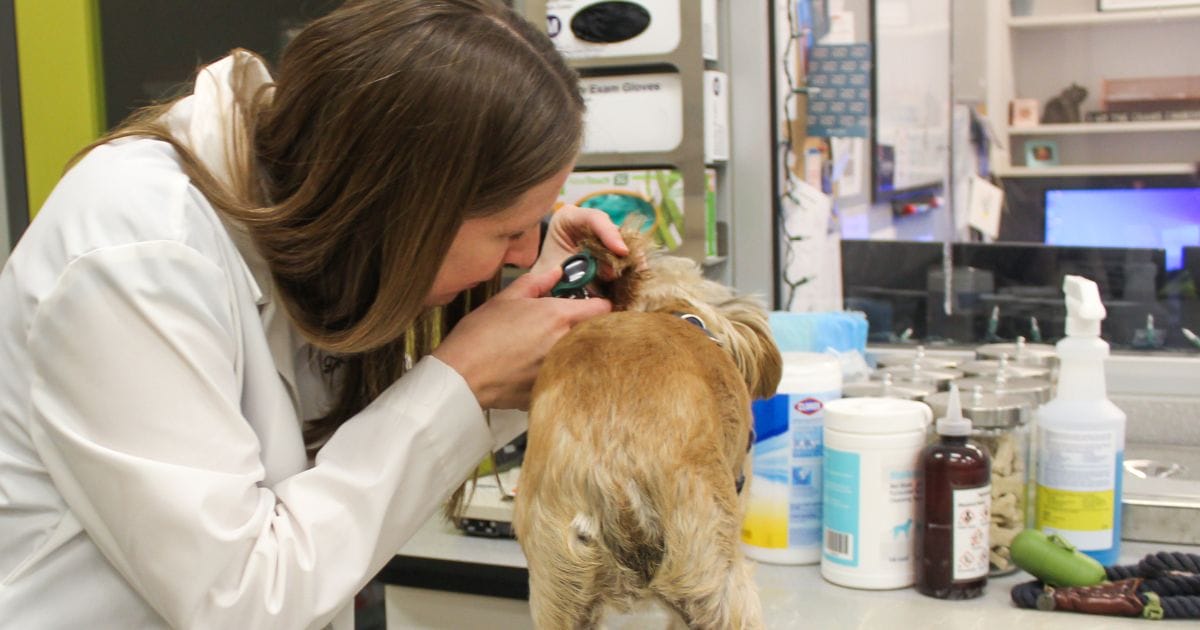Methicillin-Resistant Staphylococcus Pseudintermedius (MRSP) in Dogs and Cats
MRSP is a drug-resistant staph bacteria. Discover how it's diagnosed and treated.
What is Staphylococcus Pseudintermedius (S. Pseudintermedius)?
S. pseudintermedius is a bacterium commonly found on the skin, mouth, nose, or in the gastrointestinal tract of ~50% of dogs and cats. It typically causes no problems at all but it can cause opportunistic infections. This means that if your pet becomes sick or injured, S. pseudintermedius can take advantage of their weakened defenses and cause infection. It commonly causes skin and ear infections, especially if the skin has been damaged by something else, such as scratching, allergies, wounds, etc.
What is Methicillin-Resistnt Staphylococcus Pseudintermedius (MRSP)?
MRSP stands for Methicillin-Resistant Staphylococcus Pseudintermedius. This is the same bacteria mentioned above but has become genetically altered to be highly resistant to many antibiotics.
How is MRSP Different From MRSA?
Methicillin-resistant S. aureus (MRSA) is the antibiotic resistant form of S. aureus, a bacterium commonly found on the skin, mouth, nose, and in the GI tract of humans. MRSA is very rarely contagious to pets and MRSP is very rarely contagious to people.
Are Humans at Risk of Getting MRSP?
MRSP infections are zoonotic diseases. That means they can be transmitted from people to animals or animals to people. However, this type of transmission occurs rarely, even though pet owners are probably exposed to the bacterium on a regular basis. On a scale of 1 (low risk) to 10 (high risk), the risk of a healthy adult becoming infected with MRSP is between a 1 and 2. The risk of an immunocompromised person (i.e. a person with AIDS/HIV, cancer, or organ transplant) or a young child becoming infected is 3. Immunocompromised people are more susceptible to many kinds of infections.
How Did My Pet Become Infected with MRSP?
Infections occur commonly in compromised pets. A compromised pet is one that has an endocrine disease, systemic illness, surgery, or more commonly a skin barrier defect related to allergic skin disease. Infections occur by direct contact with the bacteria from an inanimate object or other infected or carrier animal. It is also thought that recurrent antibiotic exposure can lead to resistant bacteria.
How is MRSP Diagnosed in Dogs and Cats?
MRSP can only be diagnosed by a culture and sensitivity performed by a laboratory. It may take up to 7 days to complete this type of testing. MRSP infections do not look any different from any other type of Staph infection.
How is MRSP Treated in Dogs and Cats?
All strains of MRSP are resistant to common antibiotics like penicillins (amoxicillin) and cephalosporins (cephalexin). Because strains may be resistant to other antibiotics as well, we must culture the bacteria in order to choose the most effective treatment. Oral antibiotics are useful for treatment but must be chosen based on culture and sensitivity results. Local treatment of the infection site (e.g. lancing and flushing a skin abscess, or treating with an antibacterial shampoo) is often effective and is most often done in conjunction with antibiotic therapy. With proper treatment, most MRSP infections can be successfully eradicated within weeks.
How Do We Diagnose MRSP Infection?
Simply looking at an infection is not an effective means of determining what bacteria are involved. Clear identification of pathogens is essential to devising a treatment plan. This clarity can only be provided with a bacterial culture, which involves no pain to your pet and allows our laboratory to identify the culprit within a few days.
What Should I Do if My Pet Has an MRSP Infection?
- Relax: most pets with an MRSP infection are treated successfully.
- Follow instructions: proper treatment from the start is essential in order to successfully treat this infection. Completely finish any antibiotic prescriptions even if your pet seems to be better before they are done. Reevaluate with your veterinarian as directed, so they can determine if the infection has completely resolved.
- Avoid contact with both the infected area of your pet and carriage sites: Bandage any open draining wounds as directed by your veterinarian. Carriage sites are places on your pet’s skin that harbor the resistant bacteria without lesions. These sites include the nose, mouth, axilla (armpit), groin, and anus. Do not allow your pet to sleep in the bed or lick you while being treated for this infection.
- Wash your hands or use an alcohol-based hand sanitizer. Hand hygiene is the simplest and most practical way to prevent transmission of MRSP between animals and people.
- Complete quarantine is not essential. However, use common sense to reduce exposure to other pets and people by avoiding doggie day cares, dog parks, and avoiding immunocompromised individuals. Cats should not be allowed to roam freely. MRSP can also be found in feces so removing waste from the environment is also a good practice.
- Clean: toys, bedding, and bowls with warm soap and water frequently during treatment.
If My Pet has an MRSP Infection, Will My Other Pets Develop the Infection?
You cannot prevent exposure of your pets to MRSP as it is carried by many healthy animals (and a few healthy people, in fact). Remember, MRSP (and S. pseudintermedius) is an opportunistic bacteria, so the skin must be damaged by something else in order for the bacteria to cause an infection.
How Long after the Infection Has Resolved Can My Pet Harbor the Infection at Carriage Sites?
S. pseudintermedius (including MRSP) is well-designed to live on pets. There is little information on this topic but it is possible that carriage of the MRSP bacteria can occur for months. If you have additional concerns or questions regarding Staphylococcus pseudintermedius and your pet, please do not hesitate to call your local veterinarian or your closest MedVet.
FAQs
Contents


